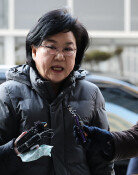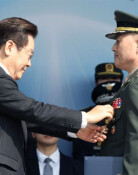[Editorial] Messing With Success
[Editorial] Messing With Success
Posted January. 28, 2010 08:53,
The government announced a plan yesterday to convert independent private high schools into either self-regulated private or regular high schools by the end of March. This is a blatant breach of the administrations promise to preserve the autonomy of private high schools. Conversion to self-regulated private high schools will be possible only when independent private high schools want to do so, the government said. To this, Hong Seon-tae, chairman of the board of Sangsan High School, an independent private high school in Jeonju, North Jeolla Province, said, I reject the government plan to eliminate well-performing schools instead of supporting them, adding, Im so disappointed, I want to give up running the school right now. Hongs frustration is understandable since he turned Sangsan around by pouring millions of dollars of his own money into the school every year. Officials at other independent high schools probably share his pain and frustration.
Independent private high schools began operating on a trial basis in 2002 as part of efforts to create a diversified and specialized high school education. The Korea Institute of Curriculum and Evaluation conducted a study based on the results of the college entrance exam and scholastic performance tests. It found that independent private high schools produced students whose academic performance matched that of the top 20 to 30 percent at ordinary high schools. In an assessment under the previous Roh Moo-hyun administration, such schools got good marks in the quality of lessons, expansion of student choice for high schools, and promotion of educational excellence. The schools were also commended since their founders, who had a strong sense of responsibility, provided financial support and operated them in a transparent way.
Those who espouse egalitarianism in education have criticized independent private high schools despite the schools good results and rising popularity among students. Main opposition Democratic Party lawmaker Choi Jae-seong once said, If a foreign language high school is a witch, then an independent private high school is the devil. A populist idea is to eliminate such schools despite the savings in taxes since students must pay tuition. The money saved could be used to improve conditions at public high schools and expand scholarships. This is clearly a win-win solution. The Lee Myung-bak administration, which says it supports diversity in education, will dissolve independent private high schools despite their high efficiency over eight years of operation. The plan is to set up self-regulated schools in their stead, but whether this will be successful is anybodys guess.
In a joint forum of presidential candidates at the end of 2007, Lee said, Students get private tutoring to enter one of six independent private high schools nationwide. Supply should increase to meet growing demand. I will create 100 such schools to give students in rural areas the opportunity to get a good education. Educational policymakers seem to want to focus on eradicating private education while undermining educational fundamentals. Getting rid of independent private and foreign language high schools is something even the previous left-leaning administration did not attempt to do. To remove such exemplary schools is not centrist pragmatism but leftist egalitarianism. If the governments plan is implemented, weakening of national competitiveness will inevitably result.







